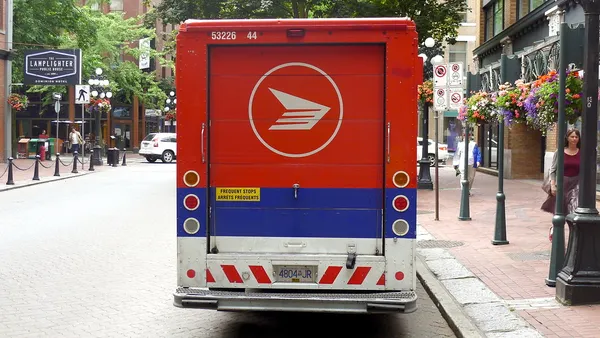Dive Brief:
- Fastenal struggled with transportation costs in the fourth quarter as freight sales — which the company uses to offset the cost of maintaining its fleet — declined by 7.5%, the company explained on its most recent earnings call. Sales growth in the fourth quarter was the lowest in at least two years, which combined with the high cost of maintaining a freight network to bring down the company's margins.
- Freight revenue was also down in the fourth quarter, which tends to happen every year due to the seasonal nature of freight transportation, but this year's drop off "was a little bit more huge," Daniel Florness said on the call. Fastenal sells industrial supplies, but also sells freight capacity with its fleet used primarily to transport inventory across the country.
- Maintaining the freight network is still "a huge competitive advantage for us," Florness said. Shipping costs can add up and become "incredibly expensive" when shipping low-value products like the industrial supplies sold by Fastenal. Florness estimates running their captive trucking fleet is about 90% cheaper than paying LTL shipping rates to meet the company's needs.
Dive Insight:
Fastenal offsets the cost of its fleet by selling freight through its Blue Lane Freight network, which runs on lanes across the country servicing its customers and branches. But Fastenal's freight operation is, like any trucking company, subject to the whims of the market. And lately, the market has not been cooperating.
This played out last year with hundreds of trucking companies going out of business, including Celadon, which was "certainly one of the largest [trucking failures] in history," one expert said.
"While the cost of maintaining our captive truck fleet is fairly stable quarter-to-quarter, our ability to charge for freight to partly offset those costs can vary depending on market conditions," Florness said. The decline in freight sales meant they were not able to offset the cost of the fleet.
Fastenal's shipping costs could add up quickly given the nature of some of the industrial supplies it sells. Products aren't always moving from the supplier straight into inventory, Florness said.
"We might be sending that Fastenal product out for secondary operations, it's going to go get heat treated, it's going to go get plated," he said.
Competitors that rely on LTL shipping can see their freight cost equal or exceed their product cost, he said.
Fastenal plans to deal with these freight headwinds with pricing discipline, but Florness didn't expand on what this would mean for shippers or rates. The company expects slow business conditions to continue throughout the first half of 2020, according to slides presented during the call.














